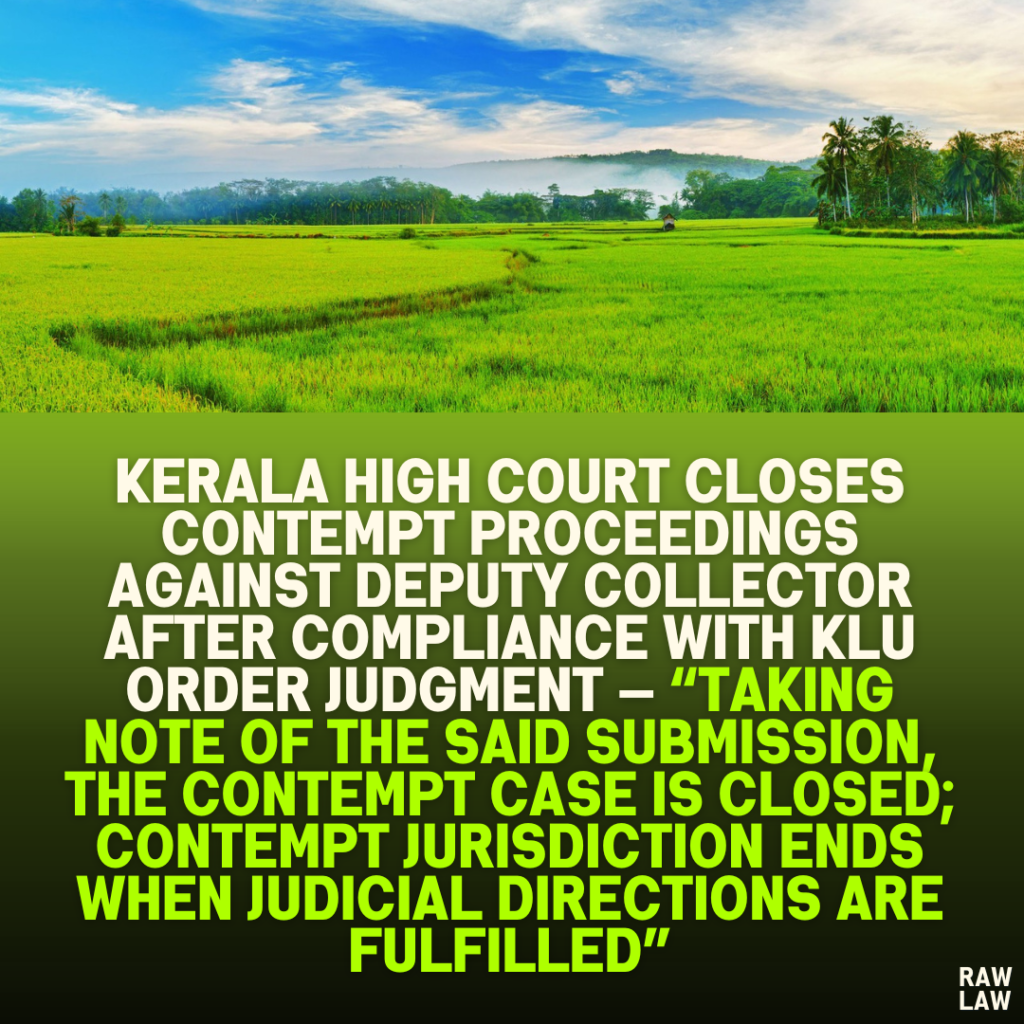Court’s Decision
The Kerala High Court, in Con.Case(C) No. 3404 of 2024, closed the contempt proceedings initiated against the respondent Deputy Collector (Land Reforms), Ernakulam. The Court recorded the submission made by the petitioner’s counsel that the directions issued in the common judgment dated 05.12.2022 in W.P.(C) No. 14045/2019 and W.P.(C) No. 16684/2019 had been complied with. Consequently, the Court held:
“Taking note of the said submission, the Contempt of Court Case is closed.”
Facts
- The petitioner is a real estate entity that had earlier filed W.P.(C) No. 14045/2019 and was also arrayed as the fourth respondent in W.P.(C) No. 16684/2019.
- The matter revolved around proceedings under the Kerala Land Utilisation (KLU) Order, 1967.
- The petitioner alleged that despite the final directions issued in the common judgment dated 05.12.2022, the respondent had failed to comply with the order, compelling the filing of the present contempt case.
- A series of documents were annexed to the contempt petition, including the proceedings of the Land Revenue Commissioner (Annexure A1), government orders (Annexure A2), the writ petitions and counter affidavits (Annexures A3 & A4), and the relevant common judgment (Annexure A5).
Issues
- Whether the respondent failed to comply with the directions issued in the judgment dated 05.12.2022.
- Whether the contempt proceedings under Article 215 of the Constitution read with the Contempt of Courts Act, 1971 were liable to be continued.
Petitioner’s Arguments
- The petitioner argued that the directions contained in the judgment dated 05.12.2022 had not been complied with within a reasonable time.
- It was submitted that despite multiple representations and follow-up, no consequential action was taken by the respondent authority.
- The petitioner filed the present contempt petition to enforce the judicial directive.
Respondent’s Arguments
- During the hearing, the respondent did not contest the matter extensively.
- The petitioner’s counsel itself submitted that the directions had now been complied with.
- This statement was treated as conclusive by the Court to dispose of the proceedings.
Analysis of the Law
- The contempt jurisdiction of the High Court is invoked under Article 215 of the Constitution of India.
- The Contempt of Courts Act, 1971 allows a court to punish for disobedience of its orders, but this remedy becomes unnecessary once compliance is achieved.
- The Supreme Court in several cases has held that if compliance is brought to the notice of the court, the contempt proceedings may be closed unless mala fide is shown.
Precedent Analysis
While the judgment itself does not explicitly refer to prior case law, the principle that contempt proceedings are not intended to operate punitively where the directions have been complied with is well established in:
- T.N. Godavarman Thirumulpad v. Ashok Khot, (2006) 5 SCC 1 — where the Supreme Court held that compliance of court orders renders contempt petitions infructuous.
- Ashok Paper Kamgar Union v. Dharam Godha, (2003) 11 SCC 1 — reiterating that contempt is not to be used to settle scores if the relief has been obtained.
Court’s Reasoning
- The Court did not conduct an elaborate inquiry or direct further notice since the petitioner’s counsel categorically stated that the judgment had been complied with.
- On that submission, the Court inferred that there was no longer any willful disobedience warranting punishment.
- The contempt petition was treated as having served its purpose and was therefore closed without further directions.
Conclusion
The Kerala High Court held that:
“Taking note of the said submission, the Contempt of Court Case is closed.”
This effectively ended the proceedings, marking satisfaction of judicial directions issued previously.
Implications
- This case reaffirms that the object of contempt proceedings is primarily to secure compliance, not to penalise.
- Once compliance is established, especially through the petitioner’s own admission, the Court is justified in terminating the contempt jurisdiction without imposing further penalties.
- It underscores the efficiency of courts in closing matters where judicial orders are eventually respected, thereby promoting procedural discipline among government officers without creating unnecessary litigation burdens.



